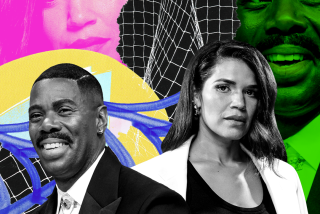Changing Surname Is Not a Game
- Share via
For decades, on-air talent in America’s television newsrooms has been getting hired for what sometimes are the most arcane reasons. They range from the logical--communicative skills, writing ability--to the dubious--stunning good looks, an attractive persona. But let someone with a minority background for one moment--one moment!--wear his ethnicity on his sleeve, something he is proud of and wants viewers to know about, and suddenly there are howls of protest.
In Scott Collins’ article “Playing the Name Game” (Sunday Calendar, Aug. 18), he cites all of the cliches ethnic journalists hear on a regular basis: Affirmative action is inspiring less-than-ethnic poseurs to take surnames that reflect non-Anglo roots; the FCC is forcing station executives to hire such on-air talent because of hiring quotas; so-called “real” ethnics are thus pushed out of big-market job opportunities.
First off, we need to make a couple of salient points that were either glossed over or ignored in Collins’ article. The hiring of minorities in on-air positions is not the “unintended result of government regulation,” as he puts it. Rather, it is the direct result of good business sense. An old broadcasting executive friend of mine once said, “I want a newscast that looks and sounds like Los Angeles.” If the viewers see people who look like them and have similar names, they are more likely to tune in, even when those individuals are of mixed blood. This has always been a sore point for some of my Anglo colleagues, however, who will take any opportunity to blame affirmative action for the highly competitive industry in which they work. It’s a rhetorical trap and Collins fell right into it, indirectly blaming people of mixed ethnicity for the anger and resentment that comes from both sides of the issue.
Collins and his “industry observers” name individuals whom they believe are involved in the “unscrupulous intent” of name-changing, myself among them. He notably omits, however, several points that I relayed to him during our interview. Among them: my mother’s status as a first-generation Japanese immigrant, the Asian cultural immersion that defined my life growing up in Hawaii and the real reason I considered changing my on-air surname in the first place: “Gary” doesn’t work well as a last name!
He also cites David Ono, a Sacramento reporter who once went by the handle “David Johnston” and a number of others from smaller markets who use their mothers’ maiden names on the air. While some of them acknowledge that their marketability has been enhanced by the change, though, there’s no denying the fact that ethnic blood does indeed course through their veins. Is the argument here that someone whose father happened to be minority (thus ensuring an ethnic name at birth) is more “cultural” than someone whose mother was a minority? Who is drawing these lines of distinction?
*
In all of the examples cited, not one person is 100% Anglo, bucking for a big-market job with a completely phony name. Collins failed to find such a “smoking gun,” although he and his sources claim there are dozens more out there. I guess he just didn’t have time to find and name any of them during the months it took for him to research the article.
A white male reporter from Oregon is quoted as saying he’s sick and tired of seeing news directors falling all over themselves to hire reporters who have adopted ethnic last names. He likens the practice to “staging a story” and believes there are “surface reasons . . . not substantial reasons” it is done. Well, welcome to the world of television. I would urge reporters like him to investigate the hundreds of on-air personalities who are hired because they are stunningly handsome or beautiful (traits, I think we can agree, they did not pick up in journalism school). Many of those people are white, incidentally. So, too, are many of the reporters I have worked with who have changed their on-air names to other Anglo handles because the originals sounded funny or were unpronounceable. Is their credibility being called into question? Of course not. Smells like a double standard to me.
Perhaps most disturbing is that this chorus of disapproval is now joined by the forces of ethnic advocacy, most notably Henry Mendoza of the Chicano News Media Assn. He suggests that news directors “should at least try to verify” heritage during the hiring process. Let’s put aside, for a moment, the fact that doing so is a violation of federal law. What Mendoza is saying is that you can tell who’s more Hispanic, for instance, by finding out if they are bilingual or if they feel “at ease in both Latino and Anglo cultures.”
I wonder how well this new method will go over the first time an African American person is up for a job? Do we need to determine if there is any Caucasian in that person’s background? And if so, how much of it has impinged on the applicant’s ability to be “at ease” in black culture? After all, you can’t always tell from an African American person’s name.
None of this is to say that television journalists do not need to be accountable for their personal backgrounds, their personas, etc. We are public entities, after all, not just bylines in a newspaper. I don’t dispute that for a second. But to begrudge someone their heritage because it’s reflected in a name that was not given to them at birth is a waste of time and effort by media critics who should know better. Furthermore, those who have fought for minority representation in America’s news programming should--in the words of an old Chinese saying--see the forest for the trees.
Gordon Tokumatsu is a reporter at KNBC-TV Channel 4.
More to Read
The complete guide to home viewing
Get Screen Gab for everything about the TV shows and streaming movies everyone’s talking about.
You may occasionally receive promotional content from the Los Angeles Times.






